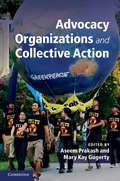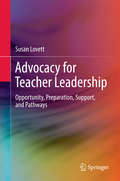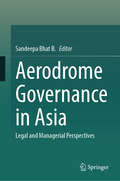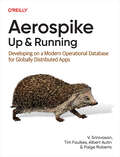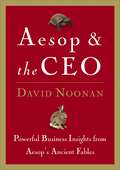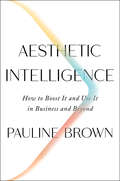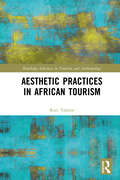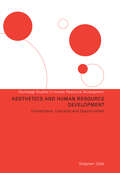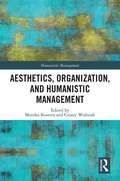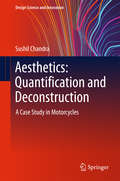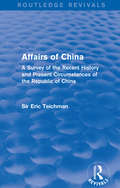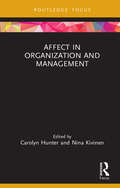- Table View
- List View
Advocacy Organizations and Collective Action
by Mary Kay Gugerty Aseem PrakashAdvocacy organizations are viewed as actors motivated primarily by principled beliefs. This volume outlines a new agenda for the study of advocacy organizations, proposing a model of NGOs as collective actors that seek to fulfil normative concerns and instrumental incentives, face collective action problems, and compete as well as collaborate with other advocacy actors. The analogy of the firm is a useful way of studying advocacy actors because individuals, via advocacy NGOs, make choices which are analytically similar to those that shareholders make in the context of firms. The authors view advocacy NGOs as special types of firms that make strategic choices in policy markets which, along with creating public goods, support organizational survival, visibility, and growth. Advocacy NGOs' strategy can therefore be understood as a response to opportunities to supply distinct advocacy products to well-defined constituencies, as well as a response to normative or principled concerns.
Advocacy for Teacher Leadership: Opportunity, Preparation, Support, and Pathways (SpringerBriefs in Education)
by Susan LovettThis book advocates for an alternative to the hierarchical positioning of leaders. It proposes to value leadership practices which emerge from collective concerns about learning and the realisation that collegial interactions offer opportunities for rich explorations of pedagogy and new understandings to be developed. The book draws upon illustrative examples from a longitudinal study of early career teachers, entitled "Teachers of Promise: Aspirations and realities". It explores matters of personal ambition, support from significant others, and barriers to teacher leadership. It shows that these vary from context to context and individual to individual. Examples highlight the ways in which each teacher's experience has been enabled and constrained by different considerations. In combination, the examples offered demonstrate the need for the teaching profession to be more systematic in identifying and supporting talented teachers who could be the leaders of learning for tomorrow. The book shows that individuals themselves need to have an openness to consider how they might become more effective teachers through their engagement in leadership work. This, it suggests, involves developing a different conception of leadership to counter the prevailing view that leadership is typically positional and defined by its distance from classroom teaching. The more promising portrayal is to link teacher leadership explicitly with learning.
Advocate: A voice from the margins
by Lennina Ofori'Vital and illuminating . . . Advocate is a book that is equally generous and insightful, putting much of modern British narratives into sharp perspective . . . It's a gift' Jeffrey Boakye, author of Black, Listed and I Heard What You SaidLennina Ofori is a force of nature: a teen mother, a supportive older sister, a PhD candidate, a support system, a social entrepreneur, a survivor. Above all, she is an advocate. She has spent her life working for those relegated to the margins, and in this book, she lends her voice to them.Weaving in her own life story, from her beautiful family to her hardest struggles, Ofori opens the door to intersections that are familiar to many - race, class and gender - and uses her expertise to embolden readers to make active change in their own lives. Drawing on knowledge from across the globe, from the teachings of bell hooks to government reports, Ofori makes accessible topics that are so often ignored. From her unique perspective as a Black woman who has lived many lives, Ofori is a daring voice for change and hope in modern life.Advocate is a tale of personal resistance, but also a manifesto for action. With great candour, wit and beautiful language, Ofori will call you to make change not just for your own sake, but for those in the margins
AeroTech Service Group, Inc.
by Andrew Mcafee David M. UptonAeroTech Service Group uses Internet protocols and other advanced computing technologies to interconnect the IS networks of McDonnell-Douglas Aerospace with many of its customers, suppliers, and other partners. The case discusses AeroTech's product and explores options for growing the firm.
Aerodrome Governance in Asia: Legal and Managerial Perspectives
by Sandeepa Bhat B.This book disseminates valuable information from both legal and managerial sides related to airport governance in Asia. With the expansion of existing airports and construction of new airports, legal and managerial aspects have become most significant for different stakeholders. Recognizing the continuous rising importance of the sector, aviation law and management courses are also being offered across the globe. The book caters to the needs of a wide spectrum of readers including scholars, researchers and students of law, aviation management, international relations and related fields; policymakers, regulators and government officials who are involved in regulating, managing and developing aerodromes in Asian countries; and professionals in aviation industry; including airport operators, airlines, aviation consultants and legal practitioners.
Aeronautical Decision-Making and Aviation Safety in the Alaskan Operational Setting
by Daniel Kwasi Adjekum Dana AtkinsAeronautical Decision-Making and Aviation Safety in the Alaskan Operational Setting introduces the reader to the real-life experiences of aviators who fly in remote settings such as Alaska in the United States. It covers the challenges related to limited aviation infrastructure and support that affect human factors like aeronautical decision-making and its impact on aviation safety.Through a unique blend of meticulous case study analysis and semi-structured interviews with Alaskan pilots, this book offers a comprehensive understanding of the proverbial challenges of flying in Alaska. It uncovers the human factors elements specific to this environment, shedding light on the factors that influence a pilot’s decision-making, which may contribute to the high rate of accidents in Alaska and other remote regions. The content is supported by historical and socioeconomic perspectives on remote-setting aviation operations. Global perspectives are discussed with narratives from one author’s experiences flying to remote airstrips in Africa. The book concludes with practical recommendations to improve decision-making and aviation safety in these remote settings, making it a must-read for aviation professionals.This insightful research is not just for academic consumption. It is a practical guide for aviation professionals, including pilots, dispatch teams, air traffic controllers, and aviation support personnel. It offers valuable insights into the human factors involved in flying in Alaska, which can be directly applied in other aviation resource-constrained geographical regions, making it an indispensable resource for those in the field.
Aeronomics and Law: Fixing Anomalies
by Ruwantissa AbeyratneThis book embarks on a contemporary analysis of the interaction of economics and law relating to air transport, delving into the major issues that plague the industry. It shows how some of the thorny and frustrating issues could be approached sensibly. Among the issues discussed are the anomaly of exponential growth of air transport which makes airline profitability continue to be poor; the legislative impediments in most countries that preclude direct foreign investment in the industry; the confounding and muddled mess behind the economics of aircraft engine emissions; and the inexplicable reality that, although civil aviation is primarily meant to meet the needs of the people of the world, State regulators have upended the equation and given priority to national interests over the interests of the passenger. The book will be of interest to economists and lawyers alike who deal with air transport issues, and also to academics and students in the area of transportation as well as regulators and airlines.
Aerospike: Developing on a Modern Operational Database for Globally Distributed Apps
by V. Srinivasan Paige Roberts Tim Faulkes Albert AutinIf you're a developer looking to build a distributed, resilient, scalable, high-performance application, you may be evaluating distributed SQL and NoSQL solutions. Perhaps you're considering the Aerospike database.This practical book shows developers, architects, and engineers how to get the highly scalable and extremely low-latency Aerospike database up and running. You will learn how to power your globally distributed applications and take advantage of Aerospike's hybrid memory architecture with the real-time performance of in-memory plus dependable persistence. After reading this book, you'll be able to build applications that can process up to tens of millions of transactions per second for millions of concurrent users on any scale of data.This practical guide provides:Step-by-step instructions on installing and connecting to AerospikeA clear explanation of the programming models availableAll the advice you need to develop your Aerospike applicationCoverage of issues such as administration, connectors, consistency, and securityCode examples and tutorials to get you up and running quicklyAnd more
Aerotropolis: The Way We'll Live Next
by Greg Lindsay John D. KasardaThis brilliant and eye-opening look at the new phenomenon called the aerotropolis gives us a glimpse of the way we will live in the near future—and the way we will do business too. Not so long ago, airports were built near cities, and roads connected the one to the other. This pattern—the city in the center, the airport on the periphery— shaped life in the twentieth century, from the central city to exurban sprawl. Today, the ubiquity of jet travel, round-the-clock workdays, overnight shipping, and global business networks has turned the pattern inside out. Soon the airport will be at the center and the city will be built around it, the better to keep workers, suppliers, executives, and goods in touch with the global market. This is the aerotropolis: a combination of giant airport, planned city, shipping facility, and business hub. The aerotropolis approach to urban living is now reshaping life in Seoul and Amsterdam, in China and India, in Dallas and Washington, D.C. The aerotropolis is the frontier of the next phase of globalization, whether we like it or not. John D. Kasarda defined the term "aerotropolis," and he is now sought after worldwide as an adviser. Working with Kasarda's ideas and research, the gifted journalist Greg Lindsay gives us a vivid, at times disquieting look at these instant cities in the making, the challenges they present to our environment and our usual ways of life, and the opportunities they offer to those who can exploit them creatively. Aerotropolis is news from the near future—news we urgently need if we are to understand the changing world and our place in it.
Aesop and the CEO: Powerful Business Lessons from Aesop and America's Best Leaders
by David NoonanIt is easy to be overwhelmed by the sheer volume of business books flooding the market today. Even more daunting is the task of weeding through them to find the "golden nugget" of wisdom inside. Now David Noonan has simplified the process by providing this well-researched primer of the most essential advice from the greatest business books ever written. Further, in a clever melding of modern business sense and ancient wisdom, he has used the animal-based stories of Aesop as springboards to launch these 50 lessons. Both entertaining and informative, Aesop the CEO includes advice from well-known leaders such as Bill Gates, Sam Walton, Donald Trump, and Lee Iacocca. The short, easy-to-read vignettes cover every aspect of corporate life: negotiations, hiring and firing, mergers and acquisitions, marketing and sales, and day-to-day management.
Aesthetic Intelligence: How to Boost It and Use It in Business and Beyond
by Pauline BrownLongtime leader in the luxury goods sector and former Chairman of LVMH Moët Hennessy Louis Vuitton North America reinvents the art and science of brand-building under the rubric of Aesthetic Intelligence. In a world in which people have cheap and easy access to most goods and services, yet crave richer and more meaningful experiences, aesthetics has become a key differentiator for most companies and a critical factor of their success and even their survival. In this groundbreaking book, Pauline Brown, a former leader of the world’s top luxury goods company and a pioneer in identifying the role of aesthetics in business, shows executives, entrepreneurs, and other professionals how to harness the power of the senses to create products, services, and experiences that stand out, resonate with their customers, and create long-term value for their businesses. The power is rooted in Aesthetic Intelligence—or “the other AI,” as Brown refers to it. Aesthetic Intelligence can be learned. Indeed, people are born with far more capacity than they use, but even those that are naturally gifted must continue to refine their skills, lest their aesthetic advantage atrophy. Through a combination of storytelling and practical advice, the author shows how aesthetic intelligence creates business value and how executives, entrepreneurs and others can boost their own AI and successfully apply it to business. Brown offers research, strategies and practical exercises focused on four essential AI skills. Aesthetic Intelligence provides a crucial roadmap to help business leaders build their businesses in their own authentic and distinctive way. Aesthetic Intelligence is about creating delight, lifting the human spirit, and rousing the imagination through sensorial experiences.
Aesthetic Labour
by Dennis Nickson Chris WarhurstThis accessible and exciting new text looks at the implications of aesthetic labour for work and employment by contextualizing debates and offering a critical approach. The origins of aesthetic labour are explored, as well as the relevant theories from business and management, and sociology. Coverage includes key topics such as: corporate strategy; recruitment and selection practices; and discrimination. Key features include: - a range of case studies from across different types of organizations and popular culture - the exploration of topics such as branding, ′lookism′, ′dressing for success′ and cosmetic surgery - suggestions for further reading.
Aesthetic Labour
by Dennis Nickson Chris WarhurstThis accessible and exciting new text looks at the implications of aesthetic labour for work and employment by contextualizing debates and offering a critical approach. The origins of aesthetic labour are explored, as well as the relevant theories from business and management, and sociology. Coverage includes key topics such as: corporate strategy; recruitment and selection practices; and discrimination. Key features include: - a range of case studies from across different types of organizations and popular culture - the exploration of topics such as branding, ′lookism′, ′dressing for success′ and cosmetic surgery - suggestions for further reading.
Aesthetic Practices in African Tourism (Routledge Advances in Tourism and Anthropology)
by Ruti TalmorAesthetic Practices in African Tourism explores "Rastahood", a community, youth culture, and new tourist art form created by young men on the margins of the Ghanaian economy as they came of age at the turn of the millennium. This book focuses on art, music, and affective experience created within tourism contexts, which enabled young men without educational or class capital to achieve mobility through work with foreigners, transforming the temporal horizon by expanding the geographic one. It traces the path that led young men down the path to Rastahood and investigates how they created an art form in, and of, a particular place and then used it to propel themselves far beyond its confines. The book ends with a leap forward into the present, out of Ghana, and beyond Rastahood, as men, now in middle age, look back upon the path that Rastahood created. It explores the social effects of neoliberal capitalism, specifically the rise of neoliberal subjectivities, collectivities, and socialities. The book will be of interest to researchers in the fields of anthropology, cultural studies, tourism, art, African and Africana Studies, popular culture; gender studies; migration; youth studies and those interested in African cities.
Aesthetic Sustainability: Product Design and Sustainable Usage (Routledge Studies in Sustainability)
by Kristine H. HarperWhy do we readily dispose of some things, whereas we keep and maintain others for years, despite their obvious wear and tear? Can a greater understanding of aesthetic value lead to a more strategic and sustainable approach to product design? Aesthetic Sustainability: Product Design and Sustainable Usage offers guidelines for ways to reduce, rethink, and reform consumption. Its focus on aesthetics adds a new dimension to the creation, as well as the consumption, of sustainable products. The chapters offer innovative ways of working with expressional durability in the design process. Aesthetic Sustainability: Product Design and Sustainable Usage is related to emotional durability in the sense that the focus is on the psychological and sensuous bond between subject and object. But the subject–object connection is based on more than emotions: aesthetically sustainable objects continuously add nourishment to human life. This book explores the difference between sentimental value and aesthetic value, and it offers suggestions for operational approaches that can be implemented in the design process to increase aesthetic sustainability. This book also offers a thorough presentation of aesthetics, focusing on the correlation between the philosophical approach to the aesthetic experience and the durable design experience. The book is of interest to students and scholars working in the fields of design, arts, the humanities and social sciences; additionally, it will speak to designers and other professionals with an interest in sustainability and aesthetic value.
Aesthetics and Business Ethics (Issues in Business Ethics #41)
by Daryl Koehn Dawn ElmLudwig Wittgenstein famously said, "Ethics is aesthetics." It is unclear what such a claim might mean and whether it is true. This book explores contentious issues arising at the interface of ethics and aesthetics. The contributions reflect on the status of aesthetic en ethical judgments, the relation of aesthetic beauty and ethical goodness and art and character development. The book further considers the potential role art could play in ethical analysis and in the classroom and explores in what respects aesthetics and ethics might be intertwined and even mutually supportive.
Aesthetics and Human Resource Development: Connections, Concepts and Opportunities (Routledge Studies in Human Resource Development #Vol. 13)
by Stephen GibbThe first book to look at both aesthetics and human resource development, this timely and original work investigates existing, as well as possible future, connections and relations between the two areas. Well structured and expertly written, The Aesthetic Challenges of Human Resource Development is undoubtedly a valuable reference for students of human resource management, business and management, and aesthetics.
Aesthetics and Politics in the Mexican Film Industry
by Misha MaclairdAesthetics and Politics in the Mexican Film Industry is the first English-language analysis of what some called a "renaissance" at the turn of the twenty-first century. It examines the years surrounding Mexicos presidential elections in 2000 and the fall of the ruling party after seventy one years in power in order to better understand a moment when politics and cinema shared the limelight. Moving beyond the international blockbusters, the research evaluates a broad selection of films, produced from the early 1990s to the present, to help demystify this period for scholars and students. It explains in clear language how production methods, audience demographics, and aesthetic approaches have changed throughout the past two decades of Mexican cinema and how these changes relate to Mexico's transitions to a democratic political system and free-market economy. "
Aesthetics in Marketing
by Rajat K Baisya G. Ganesh DasA book for Indian designers and brand marketers, Aesthetics in Marketing primarily deals with understanding aesthetics beyond its visual association and making it relevant to product designing strategies. It is the first attempt of its kind to understand the influence of aesthetics in the context of two very important sectors of the industry—consumer durables and automobile. The book analyses various aesthetic attributes, qualities and elements in a product and deliberates on the important of each of these and the kind of balance necessary among them for designing successful products. It stands out on account of the theory, concepts and models discussed, which have a strong foundation in the authors` primary research. Through real-life case studies, interviews, and company and consumer surveys, the authors have brought to the fore the important of aesthetics in various aspects of marketing, like cultivation of a brand image, and have focused on the role played by demographic variables in influencing product buying decisions. Bringing a whole new meaning to the adage `beauty is in the eye of the beholder`, this book will certainly lead to introspection on the importance of `aesthetics` in the market value of a product.
Aesthetics, Organization, and Humanistic Management (Humanistic Management)
by Monika KosteraThis book is a reaction to the reductionist and exploitative ideas dominating the mainstream contemporary management discourse and practice, and an attempt to broaden the horizons of possibility for both managers and organization scholars. It brings together the scholarly fields of humanistic management and organizational aesthetics, where the former brings in the unshakeable focus on the human condition and concern for dignity, emancipation, and the common good, while the latter promotes reflection, openness, and appreciation for irreducible complexity of existence. It is a journey towards wholeness undertaken by a collective of management and organization theorists, philosophers, artists, and art curators. Reading this book’s contributions can help both academics and practitioners work towards building organizational practices aimed at (re)acquiring wholeness by developing aesthetic awareness allowing for more profound understandings of performativity, insights into the dynamics of power, appreciation of ambiguity and ambivalence, and a much needed grasp of complexity. The varied ways of engaging with art explored by the authors promote imaginative insights into and reflection on the beauty and vicissitudes of organizing, of management knowledge and collective expression. It will be of interest to researchers, academics, practitioners, and students in the fields of organizational theory and practice, business and management history, human resource management, and culture management.
Aesthetics: A Case Study in Motorcycles (Design Science and Innovation)
by Sushil ChandraThis book addresses a perennial challenge for product planners and designers alike: how to objectively specify and quantify the aesthetics of products. It provides automotive product planners with a framework for the grammar of aesthetics and a tool for quantifying the aesthetics of an intended product. Further, it equips styling designers with a tool for connecting engineering and aesthetics. Given the author's extensive experience in motorcycle design, the motorcycle has been chosen as the frame of reference for automobiles. Specifically in the field of automobile design, where engineering and aesthetics go hand in hand, it also becomes important to clearly and objectively define the relationship between engineering design and aesthetics. Accordingly, this book (1) clearly establishes the objective parameters of aesthetics, (2) puts forward a method for quantifying aesthetics, (3) identifies the engineering design parameters affecting aesthetics, and (4) determines the relationship between parameters of aesthetics and engineering design. As such, it offers a useful guide not only for design professionals, but also for students and researchers of design.
Aetna and the Transformation of Health Care
by Rebecca Henderson Russell A. Eisenstat Matthew PrebleMark Bertolini, chairman and CEO of the health insurer Aetna, faces a number of questions as he seeks to transform Aetna from a classic insurance company into a business that will engage much more deeply with its members around their personal health goals. His strategy depends on Aetna’s ability to facilitate behavioral changes amongst its members to live healthier lives and requires very significant investments in digital capabilities and on-the-ground community-orientated health care resources. Will it work? Can he implement it? The case explores both the strategic issues inherent in this potential transformation and the organizational and leadership questions that it raises. Bertolini is a highly purpose-driven leader, and the case allows for a rich discussion of the degree to which this changes both his strategic and his organizational options.
Afdeling Duizendschoon: Werkboek voor kwalificatieniveau 3, deelkwalificatie 309 (Zorggericht)
by J. Korhorn W. Vries-PrinsZorgcategorie: Geriatrische zorgvrager Setting: WoonzorgcentrumKorte inhoud: De afdeling Duizendschoon is een afdeling in een verpleeghuis. De bewoners hebben psychogeriatrische problemen. Ze kunnen niet meer thuis wonen. Bij een blijvende opname wordt de woning verkocht of de huur opgezegd en alle eigendommen en meubels worden door de familie weggedaan. De verpleegafdeling is echt de laatste woonplaats. De mensen die op een psychogeriatrische afdeling in dit verpleeg- huis wonen delen hun kamer met drie andere mensen. Het enige dat zij nog voor zichzelf hebben is een bed, een kledingkast en een nachtkastje. En daarvan kunnen zij niet onthouden dat het van hen is, als ze dement zijn.
Affairs of China: A Survey of the Recent History and Present Circumstances of the Republic of China
by Eric TeichmanFirst published in 1938, this book aims to be a ‘true and objective’ account of China’s recent history and its present circumstances at the time, drawing on the author’s thirty years of experience as a member of the British consular service in China. The recurrent themes of the period are examined: the efforts of the Chinese leadership to build a new China out of the ruins of the old, their efforts to claim a place of equality among the nations of the world, and the development of the conflict between a resurgent China and the ambitions of Japan. Some of the issues studied were in the process of change and others definitely closed by war — nearly all were affected to some degree.
Affect in Organization and Management (Routledge Focus on Women Writers in Organization Studies)
by Carolyn Hunter Nina KivinenAffect in Organization and Management asks how affect theory understands everyday working lives through embodied, social and political practice. Discussing a range of dimensions and perspectives on affect, the book considers how subjects are formed through their connections with others, both human and non- or more-than-human. The six women writers on affect presented in this series (Sara Ahmed, Kathleen Stewart, Donna Haraway, Jane Bennett, Karen Barad and Rosalyn Diprose) all speak to important themes in organization studies, including power, politics and ethics. Each chapter explores how these thinkers have already influenced organization scholars, as well as how their work can extend our understanding of pressing organizational issues around gender, race, the environment, leadership and ethics. Feminism is a core feature of this collection, highlighting feminist writing with affective, connected and intersubjective possibilities. Each woman writer is introduced by experts on affect and organization studies. The chapters also suggest further reading and accessible resources. The book is suitable for students, academics and practitioners in business and management, organization studies and critical management studies who want to think differently about organizations.
